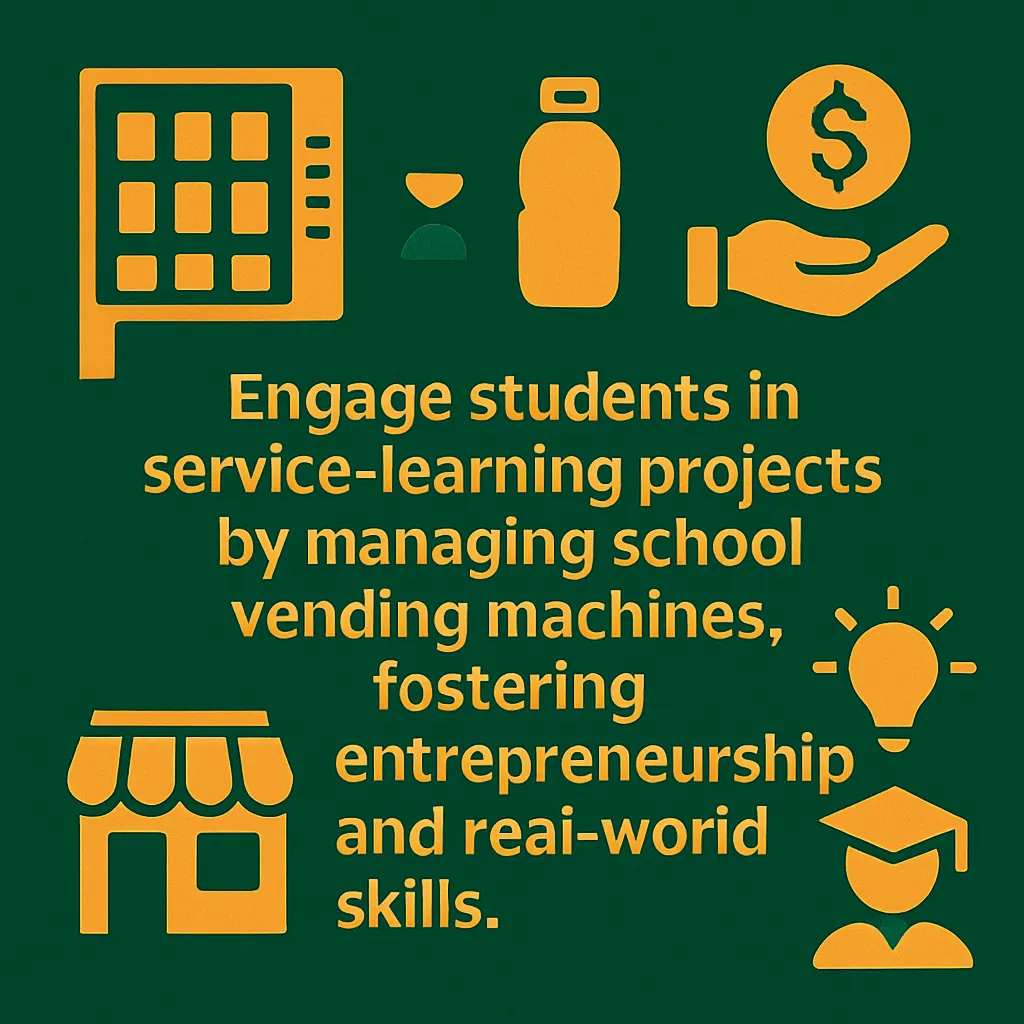Vending as a Service-Learning Project
Engage students in service-learning projects by managing school vending machines, fostering entrepreneurship and real-world skills.
Back to Vending for Schools ResourcesEngage students in service-learning projects by managing school vending machines, fostering entrepreneurship and real-world skills.
Back to Vending for Schools ResourcesService-learning projects involving school vending machines provide students with invaluable hands-on experience in business, finance, and community service, cultivating a new generation of entrepreneurs.
![]() Empowers students with entrepreneurial and financial management skills
Empowers students with entrepreneurial and financial management skills
![]() Promotes healthy eating and responsible decision-making within the school
Promotes healthy eating and responsible decision-making within the school
![]() Generates direct funding for student activities, clubs, or educational enhancements
Generates direct funding for student activities, clubs, or educational enhancements

Incorporating vending machine management into a school's service-learning curriculum offers a dynamic, practical experience far beyond traditional textbooks. This unique approach allows students to step into the shoes of business owners, gaining invaluable insights into financial literacy, marketing, customer service, and community impact. By giving students ownership of a real-world enterprise, schools can foster critical thinking and problem-solving skills that are essential for future success.
One of the core components of these projects is teaching responsible financial management. Students learn about the costs associated with vending services, from initial product procurement to ongoing stocking and maintenance. They are tasked with budgeting, setting prices, tracking sales, and managing profits. This hands-on experience demystifies economic principles and gives students a tangible understanding of how money circulates within a business and can be allocated for community benefit.
Beyond the business side, these projects emphasize the "service" aspect deeply. Students can research and implement healthy snack policies for their schools, ensuring vending options align with nutritional guidelines and promote student well-being. This involves making informed decisions about product selection, balancing popular demand with healthier alternatives, and even engaging with food suppliers. Such initiatives directly benefit the school environment by offering nutritious choices that fuel concentration and activity.
Furthermore, service-learning vending projects often involve community engagement and philanthropic outcomes. Students can decide how to allocate profits—whether it's funding school clubs, supporting local charities, or contributing to school improvement projects. This teaches students about social responsibility and the power of business to create positive change. For schools considering bringing vending into their facilities, resources like a school administrator guide to vending can provide a structured roadmap for implementation and policy alignment.
It's an educational initiative where students manage school vending machines to gain real-world business skills and contribute to their community.
These projects are highly suitable for middle and high school students, fostering entrepreneurship and responsibility.
Students develop skills in budgeting, inventory management, marketing, customer service, and healthy product selection.
It provides convenient access to snacks and beverages, can generate funds for school programs, and promotes healthy eating choices.
Absolutely. Students can research and select products that align with local and national healthy eating guidelines for schools.
Many vending providers offer machines at no upfront cost to the school, focusing on a revenue-sharing model.
Projects typically involve faculty advisors or parent volunteers who mentor students and provide guidance on operations.
Modern vending machines offer cashless payment and telemetry, providing real-time sales data for students to analyze and manage inventory.
Revenue can fund school clubs, field trips, scholarships, or be reinvested into the vending project itself for new products or machines.
No, the project is designed as a learning experience. Students gain all necessary skills and knowledge guided by advisors.